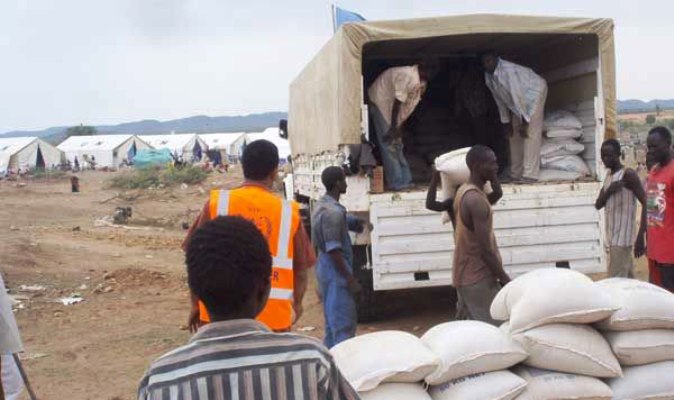Sudan vows to facilitate humanitarian work in South Kordofan

February 19, 2019 (KHARTOUM) – The Sudanese government has pledged to facilitate the work of aid groups in South Kordofan saying it is still waiting for the Sudan People’s Liberation Movement/North (SPLM-N) response to the UN humanitarian proposal.
A federal delegation from the committee on the implementation of the humanitarian work directives has arrived in South Kordofan to assess the humanitarian situation in the state.
The head of the committee, Mohamed Al-Sinnary Mustafa, on Tuesday told Sudan Tribune that they held meetings with the local officials and foreign aid groups in South Kordofan.
During the meetings, the delegation expressed the government’s commitment to facilitate the procedures of the humanitarian work and cooperate with the partners.
“We told them that we welcome the humanitarian work according to the controls and procedures that preserve the state [Sudan] sovereignty,” said Mustafa
He added the meetings agreed to activate the work of the committee’s local branch in South Korodfan so as to provide by-monthly reports to the federal committee to address all contingent issues pertaining to permissions, movement or technical agreements with foreign aid groups.
UN PROPOSAL ON HUMANITARIAN ACCESS
Meanwhile, Mustafa said the government hasn’t yet received any notification that the SPLM-N has accepted the UN humanitarian proposal.
He pointed out that the SPLM-N’s procrastination indicates that the Movement doesn’t care about the humanitarian issue.
The Sudanese army has been fighting the SPLM-N rebels in the Blue Nile and South Kordofan, also known as the Two Areas since 2011.
Last September, Sudan agreed to an initiative from the UN to deliver humanitarian assistance to civilians in the rebel-controlled areas in the Blue Nile and South Kordofan states.
The details of the UN initiative are made public but they seem similar to a former plan prepared b a tripartite committee including UN, African Union and the Arab League providing that the humanitarian assistance will be delivered from Sudan after its control by the Sudanese authorities and its distribution will be monitored by UN, AU and Arab observers to ensure that the rebels will not get it.
The SPLM-N officials in the past told the mediation they insist on the external stations because they want to have a humanitarian corridor to ensure the transportation from the landlocked rebel-areas of ill or wounded fighters to outside the country for treatment.
The SPLM-N is now divided into two factions: one led by Abdel Aziz al-Hilu and the other led by Malik Agar. The rift emerged in 2017 over the right of self-determination and other organisational issues.
Talks between the Sudanese government and the SPLM-N for a cessation of hostilities and humanitarian access are stalled since August 2016.
The SPLM-N demands to deliver 20% of the humanitarian assistance through a humanitarian corridor from Asosa, an Ethiopian border town.
But the government rejects the idea saying it is a breach of the state sovereignty and a manoeuvre from the rebels to bring arms and ammunition to their locked rebel-held areas in the Two Areas.
The SPLM-N, in November 2016 declined an American proposal to transport humanitarian medical assistance directly to the civilians in the rebel-held areas in the Blue Nile and South Kordofan.
Also, during talks in February 2018, the Sudanese government and SPLM-N al-Hilu failed to reach a cessation of hostilities agreement.
The mediation delinked the ceasefire and the humanitarian access and focused at this round only on the cessation of hostilities agreement.
However, differences between the sides emerged when Khartoum proposed that the cessation of hostilities be a step towards a permanent ceasefire and humanitarian access.
(ST)
